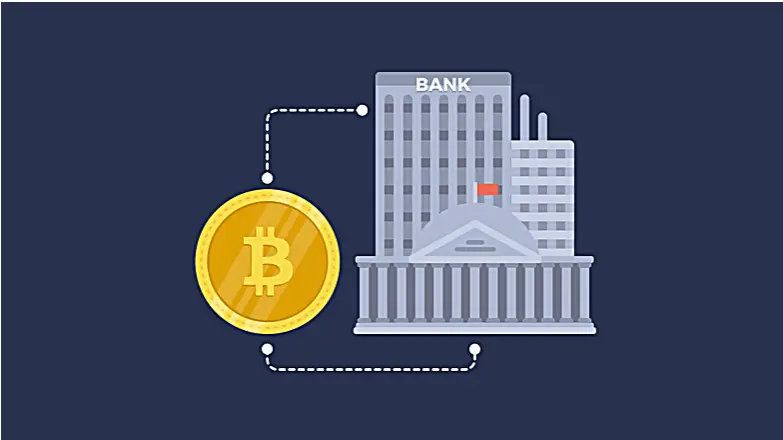In today’s article, we will discuss the different advantages and push factors of banks and cryptocurrencies. We’ve reached a point in our lives where this time is the era of cryptocurrency. It’s commencement to feel normal to think that crypto could one day substitute the standard currency. But, have you considered that it could overthrow our entire monetary system, including banks?
The pecuniary industry isn’t seen in a constructive light. Stakeholders hold very slight trust in banks and the financial sector. Many observed the greed and blur that led to the 2008 economic crisis. The stakeholders may be open to reinstating banks with a better system. But the question is, could that improved system really guide us to the era of cryptocurrency?
Why Banks are the Pillars of Society: Exploring their Vital Role in Economic Growth
Let’s establish a basic coverage of what jobs banks are responsible for handling even in the era of cryptocurrency:
Currency storage and security: Banks grasp your savings and current accounts. They’re primarily used as repositories for your currency when it’s not in use. You can relax easily knowing that money is secure because most are FDIC insured.
Underwriting and supervision: Investment banks serve functions distinct from those of commercial banks. They aid in underwriting. Also, they may help businesses make important decisions like whether to move forward with a merger or acquisition.
Transaction management and record keeping: Your bank takes the accusation of managing your dealings, whether it’s processing checks and credit card activity or relocating between accounts. They also keep thorough logs of all these dealings.
Borrowing and financing: Banks are accountable for making possible borrowing, financing, and other monetary products. Without banks, you wouldn’t be able to get a line of credit for your business or a mortgage for your house.
Conversion and exchange: You can pull out your money from your bank in more or less any form. This includes cash from an ATM. At various banks, you may also be able to trade one type of currency for another.
Financial stability: Central banks are characteristically government body that oversees interest rates. Therefore, they endeavor to manage inflation. Also, central banks cautiously control how much currency is printed and dispersed at any given time.
The dark side of banks: Understanding the push factors that can sabotage your financial goals
These all seem like priceless services. Why would anyone desire to reinstate these functions in the first place in this era of cryptocurrencies?
Bank fees: These fees vary from annoying to blatant. Withdrawing money from another bank’s ATM might only cost you a dollar. However, you might disburse $10 a month to keep your savings account open. Aside from that, you could pay $20 for overdraft protection and pay $25 or more for an overdraft. The fact is we could do all this without many of these fees. If removed, the average person could save hundreds to thousands of dollars per year.
Personal direction: Banks are usually massive communal bodies. However, they’re prescribed by people. People make conclusions about whom to loan to, how to devote money, and how to manage the flow of currency. Since people are often ambitious by greed and self-interest, that makes the structure dangerous.
The banking system: It can be annoying. The arrival of online banking and the commonness of ATMs make it easier for customers. Yet, you may still run into the subject of relocating funds between banks and processing comparable transactions.
The Ultimate Guide: What Cryptocurrency Can Replace in Your Life
In an era of cryptocurrency, here’s what it might replace:
Storage and security: There are many ways to stock up your cryptocurrency with “wallets” available on thumb drives, desktop computers, smartphones, and online services (which might bear fees comparable to banks). The way your bank account is federally insured, cryptocurrency isn’t. Cryptocurrency is highly secure. This is as long as you keep a trail of your passwords and don’t let your hardware fall into the erroneous hands.
Transactional security: Cryptocurrency depends on a dispersed ledger. This openly keeps track of all dealings to eradicate the possibility of transactional fraud. It uses encryption principles that keep all transactions unidentified at the same time. This system would prevent the need for a checking account, at the slightest hypothetically. Also, it would make sure that stakeholders could safely exchange their money for goods and services.
Exchange (to an extent): Crypto can also be willingly replaced for practically any other type of currency almost at any time. As the reach of cryptocurrency gets better, these capabilities will expand. This will dole out our population with additional types of exchanges.
Importance Things Cryptocurrency Can’t Replace: Why Human Touch Still Matters in Financial Transactions
Even in this era of cryptocurrency, there may be a number of banking characteristics that it just isn’t ready to replace:
Important financial products: There’s nothing intrinsic in cryptocurrency that permits things like car loans, properties, or business lines of credit. These are significant financial products that keep our financial system moving. For the predictable future, we’ll still need banks to lift up the slack here.
Investment banking: Cryptocurrencies may also be not capable of replacing investment banking. That’s because there’s nothing in the system to assist in underwriting or in overseeing acquirement. For all that, we’ll still need human experts.
Central bank functions: Cryptocurrency can’t duplicate many of the imperative functions of a central bank though that may be part of its petition. Cryptocurrency naturally socializes itself through a fixed scale of crypto distribution centers. Yet, there’s no one to oversee interest rates or control inflation. This could be a weakness in the long term.
In the end to summarize all the points we discussed above, here is a little comparison between banks and cryptocurrencies:-
At this point, it should be obvious that cryptocurrencies do pretense a threat to banks. They may not be able to swap all functions and characteristics or do so within the next quite a few years. However, they can certainly demoralize the immense majority of the financial industry’s purpose.
Yet, all hope is not gone for the financial industry even in the era of cryptocurrency. There is an abundance of time to alter in response to this threat. Some banks like Bank of America are already brainstorming ways to progress. If banks can restructure their core products, retool their fees, and start adopting more services conducive to a world driven by cryptocurrency, they could easily thrive in a world where crypto is the norm.







